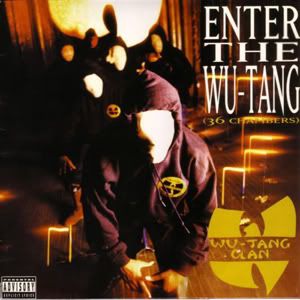
Artist: Wu-Tang Clan
Album: Enter The Wu-Tang: 36 Chambers
Label: Loud
Year: 1993
Revolutionary in every possible way, Wu-Tang Clan's first record re-defined hip hop forever. It stands today, almost two decades later, as not only the finest hip hop record ever, but one of the greatest, most ruthless albums of all time. It's one of those albums that proves volume is nothing, and attitude is everything when you are defining roughness. The Stooges could've played acoustic guitars and bongo and still been the roughest band in rock with their attitude. Coming towards the tail-end of one era of gangsta rap, but before the next era began, Enter The Wu-Tang couldn't have come at a more perfect moment. Rap's golden era was all but officially over, and it was time for a new voice and style to bring rap forward. Make no mistake about it: contextual factors, the lyrical content, the music itself, and the entire identity of Wu-Tang was revolutionary, and all of it is a part of its brilliance. Let's examine each of these in backwards order.
Underground rock music had featured mystery of identity as a concept for a long time. Bands like The Beatles and Stones gained popularity as band member's identities were marketed (look at The Who Sell Out's iconic album cover). So it makes sense underground music would not do this: The Velvet Underground dressed in black, Sun City Girls and The Residents wore masks/kinda sorta hid their identity, and even The Band didn't want to have their faces photographed for a while, and their name is an attempt to get away from selling based on the band and not the music. Still a genre in relative infancy, rap needed an underground supergroup--a group with such a small possibility of hitting the big time, that it was inevitable that they would.
And it's all a product of the right place at the right time I guess that cemented the legacy. Funky, full-sounding production had brought hip-hop into the 1990s, away from the (relatively) thin beats of EPMD and the like: funky, jazzy samples were in vogue. Commercial hip hop was taking off with Vanilla Ice and M.C. Hammer popularizing the genre in new ways that not even Run-DMC and Public Enemy's collaborations could have predicted. The RZA's mixture of Kung-Fu samples and thick in a new way beats are the centerpiece of the record. And every song features anywhere from one to eight MCS laying it all down with multiple assaults. It's so unique, it had to make a splash.
Reminiscent of Paul's Boutqiue in that there are multiple MCs, but they seemingly don't take turns, but rather demand turns. In "Shame On A Nigga" ODB does two verses and the choruses, probably because he had more to say. On "Method Man" and "Clan In Da Front", Method Man and GZA have the spotlight the entire time. There's no "fair" allocation of turns that often happens in groups with multiple "leads." This shows how every personality of every Wu-Tang member (even the sparsely heard Masta Killa and U-God) lets their personality shine through.
The album is often hilarious, and everybody who loves hip-hop knows the entire album inside-and-out. Even the final track, a funk'd up remix of "7th Chamber" is unbelievable. Every verse is crazy, every lyric is hilarious, and every beat kills. This is hip-hop 101, and changed the rules forever of what hip hop could be.
No comments:
Post a Comment